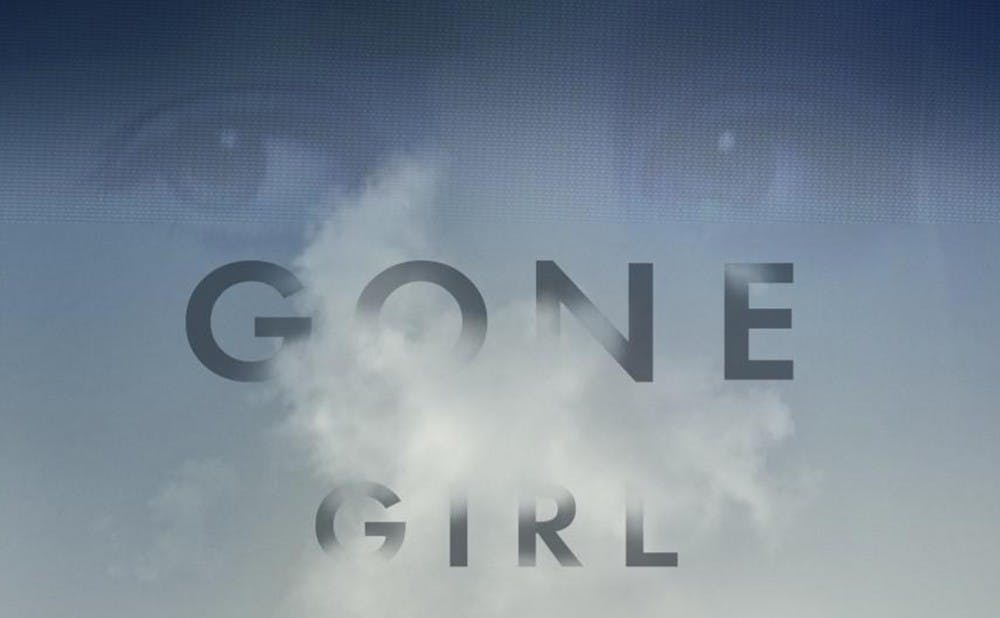David Fincher is one of America’s foremost auteurs. His style is austere, dark and cutting. His best movies analyze the depths to which the hardened facades we construct as protection end up breaking other people down. While the release of David Fincher's newest film Gone Girl, based off of Gillian Flynn’s best-selling novel of the same name, only cements his stylistic legacy, it does not stand out compared to his other films.
Gone Girl is one of his better thematic explorations, with its picture of a marriage which is failng due to the fundamental distrust between the two parties. In this case, we have Nick (Ben Affleck) and Amy Dunne (Rosamund Pike), a pair of New York writers forced to move back to Nick’s backwoods hometown of New Carthage, Missouri after being laid off. Amy, a trust-fund legacy and insecure daughter of famous child psychologists, chafes under the boredom and repression of life in the boonies. Nick, on the other hand, invests all of their money in a failing bar co-run by his sister Margo (Carrie Coon). Tensions rise. The marriage sours. And on their fifth anniversary, Amy disappears. Could it be…murder?
To reveal any more would do a great disservice to Flynn’s novel, which Flynn herself has perfectly adapted for the big screen. Fincher and Flynn prove to be an inspired pairing of source material and director. The Social Network notwithstanding, Fincher has always been drawn to lurid material that he elevates from schlock. In many ways, Gone Girl is like watching a director on cruise control. His signature visual markers are here, and, arguably, better than ever. The images and camerawork pop off the screen sharply, and his normal collaborators, Trent Reznor (of Nine Inch Nails fame) and Atticus Ross, provide an abstractly eerie score as evocative as those of The Social Network and The Girl with the Dragon Tattoo. It is technically perfect, but it all feels a little anodyne. Gone Girl is the product of a director who knows what works, and, while the film does work, one wishes that Fincher had brought a little more abstraction and flair.
As always, Fincher excellently works with the actors. The clear standout in the cast is British character actress Rosamund Pike as the complex Amy. Simply put, she is sensational. In Flynn’s novel, Amy was a fascinating, but frustratingly shallow, character. Pike completely upends the character, bringing equal measures sweetness and steel with a sinister wit that catches everyone off guard. As the titular “gone girl,” she dominates the film onscreen and off, and her presence infuses all of the other characters. Her mid-film dissection of the trope of the “cool girl” is devastatingly accurate and exceptionally well-acted. This is an honest portrayal of a woman on her last nerve with how society has limited her. With the exception of Rooney Mara’s emotionally charged Lisbeth Salander in The Girl with the Dragon Tattoo, Fincher does not often develop female characters well. Pike’s Amy is not only the most-developed woman he has ever portrayed onscreen, but also Fincher's most-developed character period.
The rest of the cast ably lives up to Pike’s high standard, so many Oscar nominations should be expected. Affleck is perfectly cast as the smarmy Nick; he utilizes his public persona to good effect as a hotshot gone to seed. Coon, a relative unknown, is another breakout in the cast as Margo. She and Affleck have the most believable chemistry in the film as brother and sister, which is a nice contrast to the unease of Nick and Amy. Other standouts are Tyler Perry, as Nick’s unctuous lawyer, Kim Dickens, as the stern and conflicted lead investigator in Amy’s vanishing, Casey Wilson, wonderfully catty as the Dunne’s pregnant neighbor and Missy Pyle’s witheringly satirical take on Nancy Grace-type media figures. The only weak link (and, boy, is it weak) is Neil Patrick Harris as Amy’s creepy ex-boyfriend. His Grand Guignol approach to this character is both awful and cliché in equal measures. Instead of neuroses, he gives us heavy breathing and stares that linger just a little too long. Harris is normally a good actor, but his scenes disrupt the severe tone of the film so much that it is a wonder Fincher did not correct them.
Gone Girl is very much a David Fincher production. It fits neatly within his catalog and is mostly riveting. However, I suspect history might not be so kind to Gone Girl within the context of his filmography. Fincher has shown us that he is capable of some legitimately visionary films, and Gone Girl, for all of its merits, is gilded pulp. It is an excellently directed, excellently acted film with an abundance of slickness and artificiality, tying it into Fincher’s thematic oeuvre. Although Gone Girl is by-the-books Fincher, it is tough to begrudge him much. Even Fincher on autopilot is better than most other directors working today.
Get The Chronicle straight to your inbox
Signup for our weekly newsletter. Cancel at any time.

